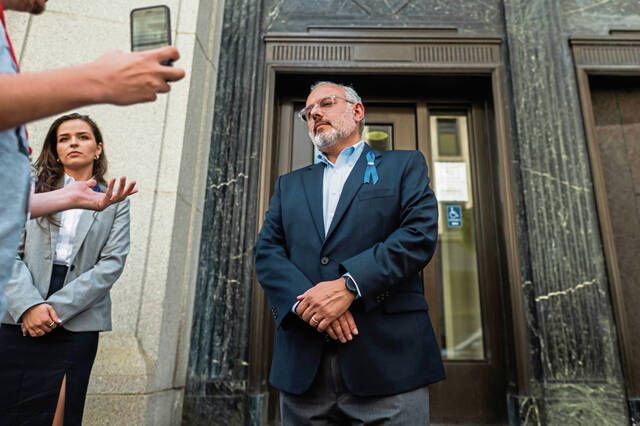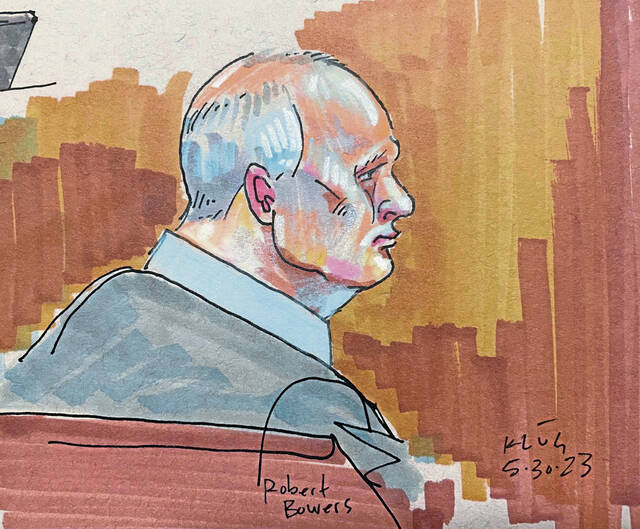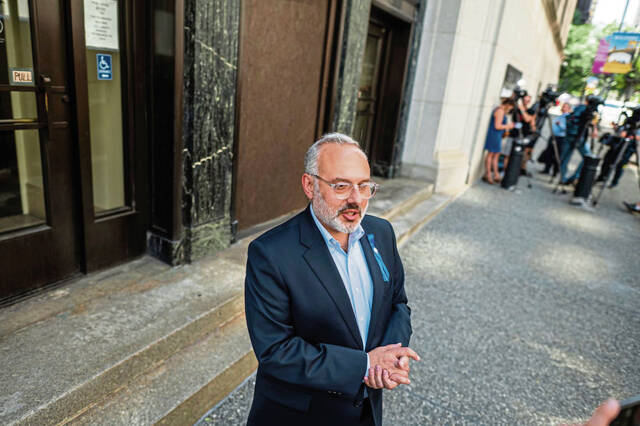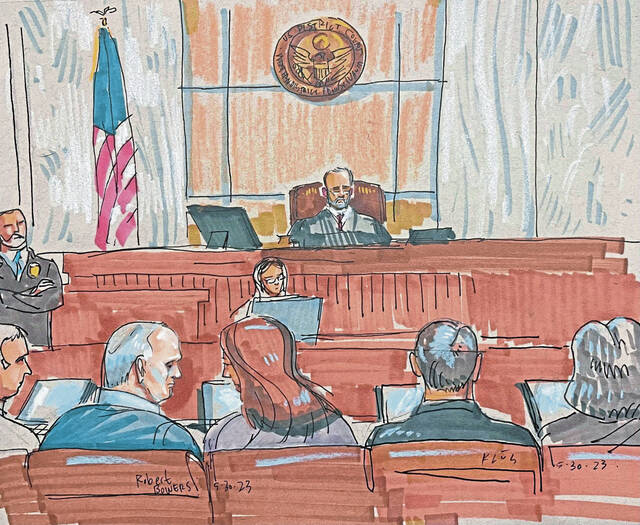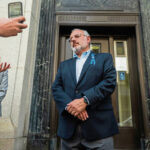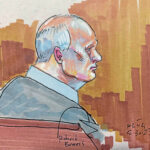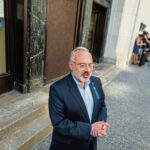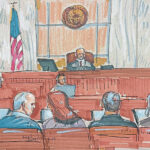Robert Bowers is eligible for the death penalty.
Whether a jury will impose it will be determined over the next few weeks.
On Thursday, after deliberating for less than two hours, a jury of seven women and five men found that the man who killed 11 people at a Pittsburgh synagogue on Oct. 27, 2018, had the required intent to kill — making capital punishment a possibility.
The third and final phase of the trial will now begin, and testimony likely will last seven to 10 days. It is expected to include extensive victim impact testimony for the government, as well as mitigating evidence from the defense team.
Bowers’ trial began May 30 in federal court. On June 16, the jury found him guilty on all 63 counts, including that he obstructed the victims’ religion, resulting in death.
Twenty-two of the counts qualify for capital punishment.
For Bowers to be deemed eligible for the death penalty, the government was required to prove beyond a reasonable doubt that he had the intent to kill. It also had to prove at least one of four aggravating factors against Bowers. The defense had conceded one of the factors — that eight of the 11 victims killed were vulnerable based on their age or disability.
The victims were members of the Tree of Life-Or L’Simcha, Dor Hadash and New Light congregations, all of which worshipped at the Tree of Life synagogue in Pittsburgh’s Squirrel Hill. They were Rose Mallinger, 97; Bernice Simon, 84, and her husband, Sylvan Simon, 86; brothers David Rosenthal, 54, and Cecil Rosenthal, 59; Dan Stein, 71; Irving Younger, 69; Dr. Jerry Rabinowitz, 66; Joyce Fienberg, 75; Melvin Wax, 87; and Richard Gottfried, 65.
In the trial’s next phase, which begins Monday, jurors will decide whether to sentence Bowers to death. The jury must find, again unanimously, that aggravating evidence presented by the prosecution outweighs any mitigating evidence presented by the defense.
Anything less than a unanimous verdict would result in a sentence of life in prison with no possibility of release.
As the verdict was read Thursday morning, family members of those killed, survivors and Pittsburgh SWAT officers who responded that day gathered in the gallery behind the prosecution team.
On the defense side, Bowers sat at the counsel table, talking quietly with his attorneys, reading and writing. Although he was instructed to face the jury when he stood up, he did not do so, instead facing straight ahead.
He never looked at the jurors, even as each person was individually polled.
“Is the verdict as read to all counts your verdict?” the deputy clerk asked.
Yes, each person answered.
Following the verdict, Jeffrey Finkelstein, president and CEO of the Jewish Federation of Greater Pittsburgh, praised the jury for its work in the case.
While Finkelstein said the federation has no position on the death penalty, he added that he felt Bowers’ actions were not the result of mental illness but instead resulted from antisemitism.
“This was an act of antisemitism, and the defendant deserves to answer for his crime,” he said. “This was hatred toward Jews.”
In a statement released Thursday by New Light Congregation, co-presidents Stephen Cohen and Barbara Caplan said hatred of Jews has been a central theme of many religions and governments for more than 1,000 years.
“Since World War II, the federal government, the courts, state legislatures and governing authorities of many religious groups have acted to counter these beliefs and to ensure that all laws and customs apply equally, regardless of one’s religion,” they said. “Significant progress has been made in the past 80 years, but there is still work to be done. This trial is an important step in drawing a line between speech and action.”
Finkelstein said he spoke to some of the family members of the victims and they are somber, but eager to share their stories in the next phase, where the jury will decide whether or not to sentence Bowers to death. pic.twitter.com/pxSV2uz0at
— Ryan Deto (@RyanDeto) July 13, 2023
While the last three weeks of the case were spent on the eligibility phase of the trial, the defense clearly gave the jury a preview of what it will present in the third and final phase.
Bowers’ attorneys called five expert witnesses who talked about the defendant’s mental health and brain imaging, arguing to the jury that their client has schizophrenia and epilepsy. They told the panel Bowers could not form the requisite intent to kill because of brain dysfunction.
Although much of that testimony was technical and revolved around images of brain scans, the defense team also offered extensive evidence of Bowers’ troubled childhood, which included multiple suicide attempts, multiple mental health hospitalizations and a tenuous relationship with his mother.
Current psychological testing and medical records from his youth showed Bowers to be a loner who had difficulty forming relationships. During an incident when he was 13, he was hospitalized and characterized as homicidal toward his mother.
His father killed himself when he was 6, and records and testimony showed his mother struggled to properly care for her son. The defendant repeatedly told those who examined him that he had food and housing instability as a child.
Two defense experts — a forensic psychologist and neurologist — said Bowers has schizophrenia, of which delusions are a symptom. One of those experts said Bowers’ belief that Jews are attempting to wipe out the white race by encouraging immigration is part of a delusional belief system.
The government presented its own experts to rebut that mental health testimony.
A neurologist and psychiatrist both testified that Bowers does not have schizophrenia or epilepsy, and that he has shown no evidence of delusions or seizures.
The government psychiatrist testified that he believes the defendant has schizoid personality disorder, which he said is a mental disorder, not a mental illness. Schizophrenia is a pathological disease, the expert said, while a personality disorder can be characterized as a “maladaptive pattern of relating to the world.”
Schizoid personality disorder is on the same spectrum as schizophrenia but does not feature delusions.
The government experts noted that Bowers had never been previously diagnosed with schizophrenia or epilepsy, and that, since his arrest, he has never been treated for either.
That made the defense diagnoses suspect, one of the experts testified.
Experts on both sides who evaluated Bowers within the past year testified that he spoke extensively about his crime to them, bragging about his actions, describing the sights and sounds during the attack and expressing regret that he didn’t kill more victims.
During closing arguments in the eligibility phase on Wednesday, prosecutors dismissed the defense experts’ findings that Bowers had delusions.
Instead, they characterized his antisemitic beliefs as part of a white supremacist subculture believed by many online.
“You heard no clear or compelling evidence the defendant has schizophrenia or whether his beliefs about Jews are delusional,” said Assistant U.S. Attorney Soo Song.
Even if those things were true, Song said, that didn’t mean Bowers couldn’t form the intent to kill.
The jury did not hear the same kind of emotional, painful and graphic testimony from attack survivors during the eligibility phase as it did during the trial’s first phase, in which Bowers was found guilty. Song reminded jurors during her closing argument in the eligibility phase on Wednesday how horrific, calculated, methodical and premeditated Bowers’ actions were.
“To him, a Jew is a Jew is a Jew,” she said. “The defendant regrets he didn’t kill dozens more.”
Defense attorney Michael Burt told the jury his client’s obsession with immigration and Jews, which he said came from online indoctrination, was just further proof of his delusional belief system.
“What happens when your brain is broken? When you don’t have the ability to know what is truth and not truth when you’re given distorted information on the internet?” Burt said. “What if your brain is not able to process that all of that is false, fake?”
Bowers wasn’t acting consciously, Burt continued. Instead, his mental illness made him believe he was acting in service of humanity.
“The government would have you believe this is normal political thinking — normal political rhetoric or ideology,” Burt said. “If that is part of political discourse, folks, then we are in trouble.”


